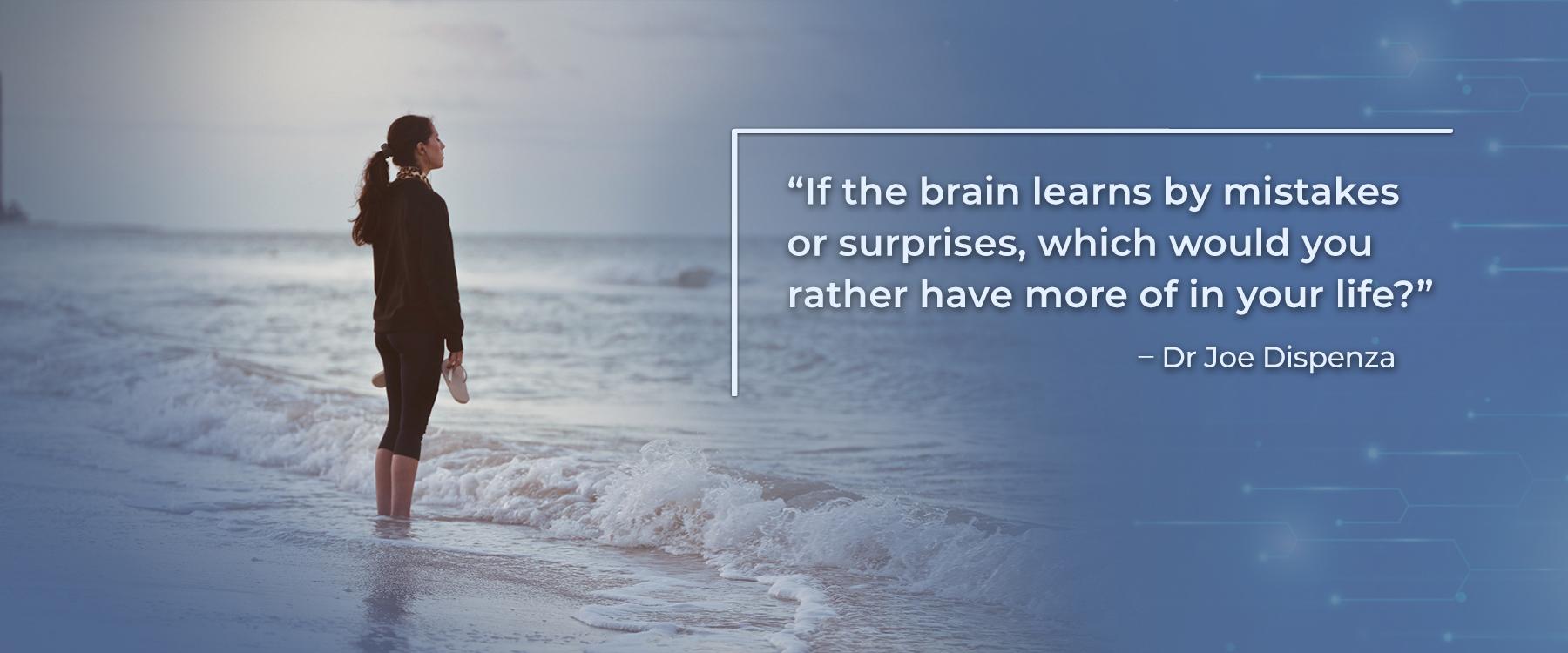Creating More Surprises and Fewer Mistakes
Dr Joe Dispenza | 29 August 2015
The past is an interesting concept. By definition the “past” refers to a time that has already happened. However, that isn’t how we experience it in our own lives. We have the ability to relive events over and over again in our minds. This ability to recall and relive is a gift that many of us fail to properly utilize. We tend to focus on the negative aspects of our lives and forget the positive.
Think about your day for a moment. What happened? Were you complimented on your work? Maybe a friend drooped by unannounced for lunch? Did you find $20 on the ground? Were you pulled over for speeding?
When asked to recall what happened my guess is that most people would emphasize getting stopped by the police. If we removed this one scenario then the rest of the day looks really good, maybe even great.
From an evolutionary standpoint, a mistake is a threat to our survival. This makes sense given the right context. Early humans were at the mercy of their environment and so they needed to be vigilant. At that time a slight misstep could mean the difference between life and death. Our brains are genetically wired to keep us safe and a mistake threatens our security.
For most of us this reality no longer exists. Rarely do our mistakes carry with them such dire consequences. Think about it. We make multiple mistakes a day, every day and yet we’re still alive. Despite this regularity we still spend an exorbitant amount of time and energy re-living the past.
There is a benefit to analyzing our mistakes. If you walk down the stairs and hit your head on a beam then you’re going to be more cautious the next time. We run into problems when we over-fixate on a mistake. That mistake is usually tied to emotions like regret, guilt or suffering and those emotions are linked to specific thoughts. Whenever you think about that mistake your brain releases the same chemicals as if the experience were happening at that moment and that causes you to feel the same emotions equal to that past experience. And if those emotions drive more thoughts equal to those feelings and thus you can’t think greater than how you feel, then you’re caught in a loop of thinking and feeling, feeling and thinking which creates our state of being. From a biological standpoint now you are living in the past.
In this model a mistake is something external, meaning it feels like it’s out of our control. When we don’t learn from our mistakes, modify our behaviors and thus gain the wisdom from our faux pas, then we become victims of reality instead of creators of reality.
How do we make the transition from victim to creator? In our workshops we teach people how to combine a clear intention with an elevated emotion to create a new outcome in their lives. Central to this idea is that we must surrender to the unknown. By this I mean we don’t try to manipulate how the new experience will come to us – it’s a surprise. If we can predict what will happen then the experience really is nothing new.
This is a scary concept for a lot of people and requires an understanding that some surprises can also be mistakes. We’ve defined our world as either/or but we need to get comfortable with “and.” We can’t control the surprise, the best we can do is put ourselves in position to accept it when it comes.
And when we do we set ourselves up to be awed, inspired or overjoyed. These feelings and emotions create a new loop, one that brings the potential for more positive experiences because we have, through a new experience, replaced the old wiring in our brains with something different and those emotions then inspire us to create again…and again. Now, when you recall that new memory your brain releases that same chemical(s) which, in turn, causes that feeling to return. Humans tend to think and feel within our biology, so, by adding a new experience, we alter our thinking (neurology) and our feelings (chemistry), which produces a change in our biology by creating a new state of being.
Earlier, I asked you to think about your day and mentioned some examples. By doing the work and truly changing your mind to create a new state of being won’t prevent a speeding ticket. However, with a new mind you will be able to see your mistake more clearly. Even more important, you’ll be able to appreciate the compliment from a coworker, lunch with a friend and the found $20 bill. Given what you’ve just learned it should be clear that you have a choice. If the brain learns by mistakes or surprises, which would you rather have more of in your life?

Comments